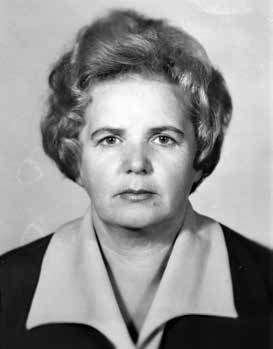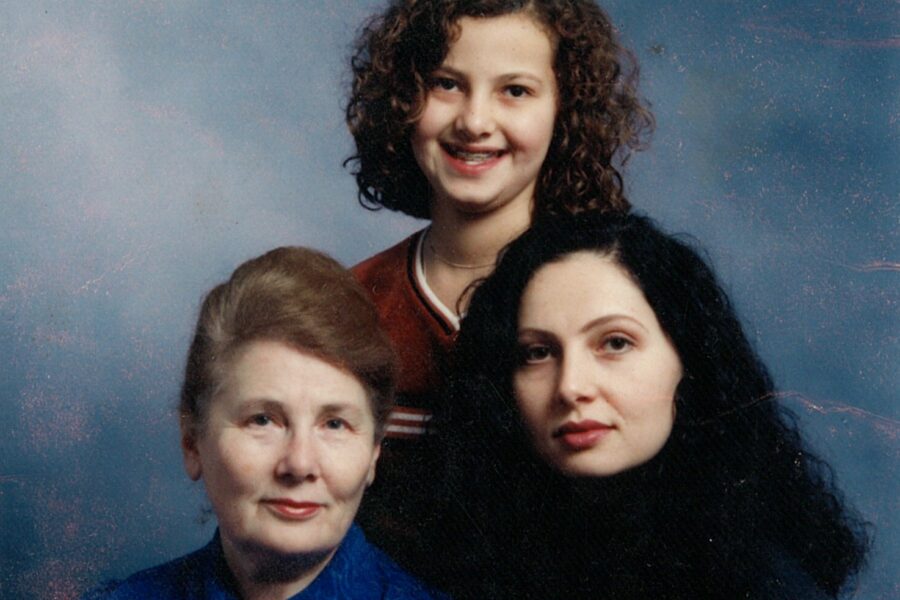Sometimes I cannot believe that a child’s memory can preserve all these memories of what my family and I endured. I was thirteen years old when I became a ghetto prisoner. But it is better to start from the beginning: I was born on May 13, 1928, in a small town called Nowogródok, Poland (later Novogrudok, Byelorussia) to Shepa and Beila Ginenskaya. My name at birth was Rivka but later changed to Rita. I had two older sisters, Dasha (Doris) and Grunia. My father ran a small store that sold household items. My mother was a housewife. My paternal grandparents were Isaak and Sorki. Though my immediate family was not large by the standard of the time, we had a big extended family.
Our family lived in a modest home that had two small rooms and a kitchen. My sisters and I slept in one room. I was born into a religious Orthodox Jewish family that strictly observed the Sabbath and the laws of kashrut as well as other aspects of a traditional Jewish way of life such as synagogue attendance. My parents taught their children Jewish traditions and prayers, which we repeated and memorized daily. I still remember many of the prayers. My mother and father were not very educated, but that did not prevent them from instilling in their children the values of family relationships, respect for people and humanity, aiding the poor, and helping those in need. Both Polish and Yiddish were spoken at home.
I attended a Polish school where we had classes in both Catholic and Jewish religious instruction, depending on the students’ faith. I had both Jewish and Christian friends, although I do recall mounting antisemitism in the years before the outbreak of World War II. My family lived next door to either a rabbi or a chazzan (cantor) whose home was sometimes pelted with stones by Poles. Despite incidents of antisemitism, my childhood was a happy one with loving parents and sisters who were close to one another.
My family and I heard little about Hitler and the Nazis in Germany. People remembered a relatively benign German occupation of the area in World War I, so we did not feel any threat or danger from Germany. A secret protocol of the Molotov-Ribbentrop Pact of August 1939 called for the division of Poland between the two totalitarian states; therefore, shortly after the Germans invaded Poland on September 1, 1939, and started World War II, the Soviet Union occupied eastern Poland and our town, which became Novogrudok. My father’s store was nationalized, and he became a salesman responsible for the shipment of goods. I continued going to school, and I was totally unprepared for what would befall me and my family when Nazi Germany invaded the Soviet Union on June 22, 1941.
Before the war, no one knew about Novogrudok, my Byelorussian city, which back in the day had been a capital of the Grand Duchy of Lithuania. The city became well-known when Holocaust survivors spoke about what happened there during the war.
The Germans occupied Novogrudok on July 3, 1941, following a heavy bombardment that caused a great deal of damage. Jews were subjected to numerous restrictions, plundering, and forced labor. Several Jews, including the intelligentsia, were immediately murdered. The Germans soon established a ghetto for Jews, an area enclosed by barbed wire where all Jews were forced to resettle.
We had no choice: it was either the ghetto or death. All Jews were herded into a large house. My grandparents, elderly and sick, also were put into the Novogrudok ghetto with our entire family. My grandparents said that that they did not want to remain in the ghetto, so they were shot down in the presence of our entire family. This is how my grandfather, grandmother, and two of my father’s sisters met a horrible death. My parents wanted to take the two bodies of their loved ones out of the ghetto and bury them, but we were not even allowed to leave the house where we stayed. Our family does not know what happened to their bodies, or if they were buried. In the ghetto, those who resisted and did not obey the Germans were immediately shot or hanged, and often their bodies were hung in the square. Later the Germans ordered all Jews to register and to wear yellow badges with a five-pointed star.
My family had been in the Novogrudok ghetto for two years and three months. Living conditions in the ghetto were atrocious, beyond horrible. We were all crammed into one gloomy place. The Germans built wooden bunk beds on which we all slept. Our bedding consisted of old blankets and pillows. We were deprived of all rights, and for any disobedience we could be shot immediately. My father and two older sisters became forced laborers at a German military installation outside the ghetto, but they had to return in the evening. However, they could at times get food and smuggle it into the ghetto. My mother and I worked inside the ghetto. There were no opportunities for study or schooling. I do not remember any organized religious life in the ghetto; the only prayers we prayed were to ask G-d for salvation. Many people died of hunger and disease. I witnessed four aktions— operations that exterminated Jews. My childhood memory has preserved vivid images of the death of relatives, my father’s death in 1942, hunger, cold, human misery, and humiliating treatment by German policemen and their servants.
At one point when the Germans decided to reduce the size of the ghetto, my mother and I, together with others from the ghetto, were put on a truck. We were to be shot in a nearby wooded area; however, it was near nightfall, and the killers decided to wait until the next morning to carry out the murders. The people targeted for murder bribed a German guard. They escaped and hid in a bunker in the ghetto. Among the seventeen people in the bunker were my mother, my sister, Grunia, my two cousins, and I. We remained in the bunker for several days without any food. When Doris, my eldest sister, found us in the bunker, only a handful of the original seventeen people were alive, but they were in a wretched condition. My body was covered with sores. “I stood on corpses under my feet,” Doris said. The survivors managed to find sanctuary in the Novogrudok ghetto for skilled workers, which was still in existence.
Berl Joselewicz and Natan Sucharski led a resistance group in the ghetto. They encouraged the ghetto’s surviving inhabitants to dig a tunnel under the barbed wire fence. We laboriously dug late at night for three months. We used whatever tools we could find—from shovels to iron mugs—and carefully hid the clay earth wherever we could: attics, in an old well without water. The Germans almost never went into the barracks because they disdained the presence of dirt and stale air, so we had the opportunity to dig and prepare to escape.
On the night of September 26, 1943, about two hundred fifty ghetto prisoners escaped through the tunnel. Among those who escaped were my mother, two sisters, and I. When we got out of the tunnel and started running into the woods, ghetto guards noticed and fired at us. Many were killed during the escape; I remember that one girl lost her hand. We found partisans from the famous Bielski detachment who loaded us onto wagons and took us to the partisan family camp in the Naliboki Forest, known in the Polish, Russian and Byelorussian languages as the Naliboki puscha or “dense forest.”
We knew about the Bielski partisans who were operating in the forests surrounding the town because an uncle by marriage on my mother’s side, named Volf, was fighting with them. When the Germans came to kill his family, my mother rescued Volf’s son and daughter, although his wife, my aunt, was murdered. I also went to school with Aron, the youngest of the Bielski brothers.
The partisans saved our lives. They eventually established a miniature town in the densest part of the forest after the Germans conducted a ferocious hunt for them. I remember fleeing with other civilians through swamps into the heart of the forest. We lived in underground bunkers, but at last we lived in freedom after the harrowing months in the ghetto.
My mother, my sisters, and I stayed in the Bielski group from October 1943 to July 1944, when Byelorussia was liberated from the Nazis. I remember Tuvia as sharp, smart, resourceful, and a great organizer. Each of us had a lot of responsibilities in the partisans’ camp. My mother milked cows in the partisans’ barn, and my older sisters fought as members of a combat unit, I worked in the kitchen and sometimes did laundry for the partisans. My two cousins also had important tasks, which helped us survive and see the victory. All other members of our extended family were killed. In summer 1944 the Soviet army liberated the western portion of Byelorussia, and the Bielski group—1,230 strong—came out of the forest. However, there were still Germans in the area, and I recall that Bielski partisans continued fighting them. The Bielski detachment was the largest and most successful Jewish partisan fighting and rescue group of the war.
When my family and I returned to Novogrudok, we discovered that our home destroyed. We found a temporary dwelling but lived “from hand to mouth.” Doris, my eldest sister, had met and married a Bielski partisan and left the town. The father of my two cousins returned and took his children. My mother, my sister Grunia, and I lived together. I went back to school and continued to be an excellent student. Then I entered a nursing school, and after graduation I worked at a hospital during the summer months. I also enrolled in a pedagogical college and became a teacher of Russian language and literature. Growing up, I did not know the Russian language, so this was quite an accomplishment. I took a teaching job in the city of Baranovichi.
In Baranovichi I met my future husband, Abram Patlakh. He was a dentist to whom I went for treatment. We were married on December 4, 1952. I was happy that I found a good man, a sheyne mensch. We soon had a daughter, Alla, (now Ella Odesky) born in 1953, and ten years later we had a son, Alex, named for my father. I kept my maiden name, Ginenskaya, as a reminder of my family members who perished in the Holocaust, including most of my parents’ extended families. More than one hundred of our relatives
were killed during the Holocaust.
Despite all my traumatic and life-threatening Holocaust experiences, I rebuilt my life. I believe that my survival was due to resilience and luck and the fact that G-d chose me to live. My message to the world is to never forget. I went through great suffering, and I want the world to know and never to forget it.
Never Heard, Never Forget: Vol. II, 2022






